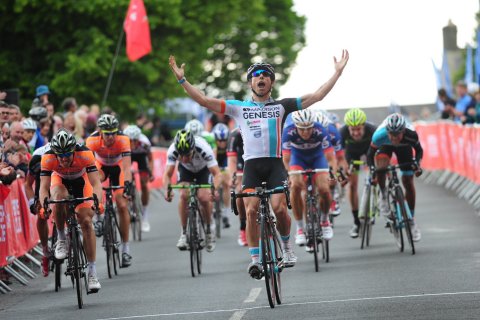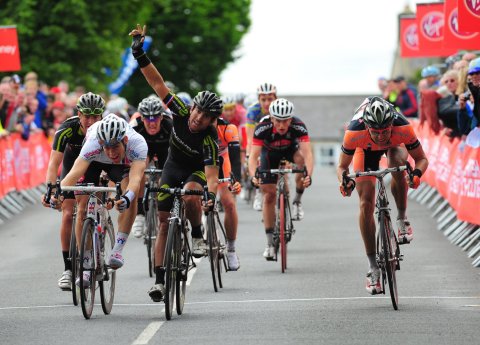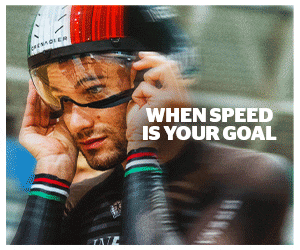Part of a huge cycling weekend in the North East (June 28-July 1), the Beaumont Trophy is one of the oldest events on the racing calendar and in 2012, was round 5 in the Premier Calendar series.
Note: This was written in 2012 and some of it (pictures/winners list) updated 2020
For many fans, the race will be remembered for the way in which Bradley Wiggins soloed to victory in 2011 to not only win the Beaumont Trophy but also the champion’s stripes as the race for the second time in its history, doubled up as the British RR Championship.The first time it was the British RR Championship was 1958.
Wiggo winning the British Championship in 2011 at Standfordham
In 2012, the race celebrated its 60th year. The event was first organised in 1952 and for the last five years has been the centre piece of the Cyclone weekend, which in 2012 includes four days of cycling events for everyone from children and beginners to professionals. The race takes its name from the Beaumont Trophy which was presented to the Gosforth Road Club by Newcastle cycling parts and accessories wholesaler, Rex Beaumont in 1952, just one year after the club was founded. That first edition of the race was won by Stan Blair riding for Viking Cycles when the race started and finished from the club’s headquarters at Gosforth Park.
Since then the race has been won by famous riders including Chris Newton, Russell Downing, Joe Waugh, Malcolm Elliott and Don Sanderson to name but a few. Talking to long time organiser Peter Harrison, he remembers well the early days when the North East had so many great champions. Riders like Don Sanderson who was the first Brit to win a stage in the Peace Race and others like Bill Baty. They were as big a star names as the likes of the Downings, Elliott and so on are today.
In the 60s and 70s, the North East had so many star riders who were riding for GB and the top teams, that just having them compete in the race made the event one of the star attractions in the then British Cycling Federation racing calendar. It has been however, long been recognised locally and nationally as a major event which is why its list of former winners has so many household names from different eras.
The most prolific winner of the Beaumont Trophy is Ray Wetherell, who won it five times.
Connor Swift becoming British champion in 2018 at Stamfordham
The Course
In 2012, the course for the race will be the same as last year, taking in the feared Ryalls climb that saw so much damage done to the peloton when the big guns decided to turn on the gas on the steep slopes packed four or five deep with fans. The only change in 2012 will be that the finishing circuit will be three laps instead of four giving a distance of just under 110 miles.
Over the years, the race has had six different routes and has varied in length from 80 miles to 122 miles. In the 1960s, 70s and early 80s, the route went out and back, starting and finishing in Ponteland and taking in some of Northumberland’s toughest climbs. The race moved to its current Stamfordham base in 2003.
Before there was an elite category in the British ranking system, the race was for Category 1, 2 and 3 riders and it then became an Elite, 1, 2, 3 event. In 2007, the event became part of the Premier Calendar Series and has since been for Elite, Category 1 and Category 2 riders.
It has always attracted a high calibre of rider thanks in part to the North East’s history of great riders: according to organiser Peter Harrison there were 11 international riders in the North East during the 1960s!
Peter Harrison
Current organiser Peter Harrison joined the Gosforth Road Club in 1961 and has been involved ever since: first as a marshal, then as a judge and then as organiser since 1979. Before Peter Harrison, the organiser was Geoff Dobson (1965 to 1979).
While many may look upon Peter as being a race organiser, there isn’t much he hasn’t done in the cycling business. He began racing at 14 years of age for the Gosforth and was organising races in his early twenties as he still is 40 years later.
After leaving the teaching profession, Peter became a restaurateur before selling up to buy a bike shop. He was then head hunted by the company Madison which was just starting out at the time and Peter became the technical man for Shimano in the UK. For 20 years, he worked at major events in Track, Road, Cyclo-Cross and Mountain Biking at World Cups and World Championships. Such is his expertise with Shimano, he was even asked to work for GB at one point not that long ago.
Away from the mechanics of it all, Peter has also been on the BC board, sat on the National Council and been a leading figure in the North East for many many years. Nowadays, the Northern Rock Cyclone festival of cycling is Peter’s passion. In 2011, the Beaumont Trophy (the British Road Race Championship), saw the biggest crowd in its history. Peter says that his race has always enjoyed good crowds, but 2011 was certainly a highlight in that respect.
For 2012, the event continues to develop with the introduction of an elite women’s race alongside the Beaumont Trophy. Called the Curlew Cup, the new race is sponsored by Northumberland National Parks and is a reflection of the rapid development of women’s racing in the UK.
That race he says will be different to other women’s National Series events because it will benefit from the same infrastructure as the men’s race, something the other Women’s National Series races cannot afford as stand alone women’s events.
Because of that, he says it would be good if the event could get the top British female riders to race the event, the professionals as well as those based in Britain. With the Olympics only a few weeks after the Beaumont and Curlew Cup, perhaps that is possible if other top riders can be brought over to make the race a worthy one on a hard course to help prepare the riders for the Olympic road race.
It’s certainly part of Peter’s desire to keep the event growing and moving forward. While Peter is aware that he may not get the same level of riders as he did last year for 2012, he is keen to keep the spectacle of the race going. IE, to promote the carnival atmosphere they had last year with trade stands and having the top riders from all the UCI Conti teams competing in the Beaumont Trophy.
In coming years, to help the event continue getting bigger, Peter admits he may tender for the National Championships again or even go UCI providing that doesn’t come with too many restrictions. Whilst he isn’t sure how big he can make the race, one thing he is sure of and that’s organising races nowadays is a lot harder than it used to be.
“I have been organising races for nearly 40 years and it used to be that organising a race, you could do it on the back of a fag packet on a Saturday morning. Now, I’ve got meetings lined up for pretty much every day for a month. Police, local authorities, Parish Councils and that’s aside from the financial side of it with sponsors and so on.”
It isn’t just the organising of the race that is more difficult. The cost of the race is also growing and he says that the costs are such that a cycling club could not underwrite them. “We’re talking major money here” he says. “The Beaumont itself had policing costs of about £16,000 in 2011. With the other bits and pieces and not including prize money, the cost was between 35,000 and 40,000 pounds.”
“That is why you have to bring in major sponsors and you have to show them a return on that investment.”
Finish of the Women’s race in 2019 – Elizabeth Bennett was the victor
It is giving sponsors that return which is a thorny question. Peter calls into question whether the TV coverage they get from British Cycling really does cut it and says more mainstream coverage is needed as well as use of modern media platforms such as YouTube and other websites. Filming it other ways and bringing that and articles on the event to the masses.
Certainly, having races shown on TV well after they have been held makes that coverage simply old news and as Peter says, cycling needs its Premier series to be shown on television in the same way the Athletic GP series is on the BBC. Away from the future though and looking back, when asked for a highlight, Peter says that the satisfaction of successfully organising the events overall is the highlight for him. He simply wants to put back more than he takes out of the sport.
It isn’t easy organising races at Premier Calendar level he says and that is why he’s unsure if we’ll see the number of Premier Calendar events grow in the future. It’s all about who has the nerve and the balls to tender for a national series race at Premier Calendar level which perhaps explains why there are so few. “I think it’s going to stay at about seven or eight events as I don’t think there are more people willing to take the chance and come in” Peter says. That explains why so many events, such as the classics in the south have managed to carry on year after year, having done so by staying outside the Premier Calendar series and thereby keeping their costs down whilst still managing to attract the top riders due to being classic British races.
Russell Downing winning in 2012, the year of this article
For sure, the Beaumont Trophy, can only become more of a high profile classic with an organiser like Peter Harrison in charge. But talking to Peter, it’s easy to see that no matter how big a race he would like it to be, achieving that will always depend on whether the powers that be allow him the freedom to do it his way. After 40 years, he certainly has the experience.
Anyone who remembers the World Cup races at Leeds and Rochester in the 90’s will remember just how popular big races can be and if anyone can do it, perhaps its Peter like he did in the 80s with his circuit races in the North East. A single day race on the same scale as the Tour of Britain would help the sport move forward for sure.
Good luck to Peter and his crew for the 2012 Beaumont Trophy. VeloUK, all being well, will be there to bring you the action.
Check out the event website for four days of cycling events for everyone
Beaumont Trophy previous winners
1952 Stan Blair Viking Cycles
1953 Don Sanderson Northern Couriers
1954 Des Robinson Huddersfield RC
1955 Don Sanderson Northern Couriers
1956
1957
1958 Bill Baty Tyne Velo
1959
1960
1961
1962 Derek Hepple Tyne Valley RC
1963 Ron Gardener Tranent Thistle CC
1964 John Dixon Barnesbury CC
1965 Norman Baty Tyne Velo
1966 Ray Wetherell Newcastle Cheviot
1967 Ray Wetherell Newcastle Cheviot
1968 Ray Wetherell Newcastle Cheviot
1969 Paul Blackett VC Electric
1970 Eddie McGourley Houghton CC
1971 Ray Wetherall Newcastle Cheviot
1972 Ray Wetherall Newcastle Cheviot
1973 Joe Waugh Tyne RC
1974
1975 Robin Childes Cleveland Couriers
1976 Alan Topp Cleveland Couriers
1977
1978
1979
1980
1981
1982 Richard Healy Ryton Cheviot CC
1983 Arthur Caygill Richmond & Darlington CC
1984
1985
1986
1987
1988
1989
1990 Rob Harris Leeds RRC
1991 Andy Matheson Musselburgh RCC
1992
1993 Richard Moore Hull Couriers
1994 Paul Curran Optimum Performance
1995 Mark Walsham Optimum Performance
1996
1997 Paul Blackett North East RT
1998 Elliot Gowland Sunderland Clarion
1999 Ian Childes Middridge CRT
2000 Billy Mitchinson STG Racing
2001 Glen Turnbull VC Briganti
2002 Richard Sutcliffe York Cycleworks
2003 Graham McGarrity Scotoil RT
2004 Mark Wordsworh Doncaster Wheelers
2005 Malcolm Elliott Pinarello RT
2006 Evan Oliphant Recycling.co.uk
2007 Russell Downing Healthnet Maxxis
2008 Rob Hayles Halfords Bikehut
2009 Bradley Wiggins Garmin Slipstream
2010 Chris Newton Rapha Condor Sharp
2011 Bradley Wiggins Sky Pro Cycling
2012 Russell Downing, Endura Racing
2013 Dean Downing
2014 Kristian House
2015 Chris Latham
2016 Dion Smith
2017 Peter Williams
2018 Connor Swift (British Road Race Championships)
2019 Rory Townsend
WOMEN
2012 Dame Sarah Storey
2013 Hannah Barnes
2014 Katie Archibald
2015 Laura Massey
2016 Nicki Juniper
2017 Julie Erskine
2018 Jessica Roberts
2019 Elizabeth Bennett

























